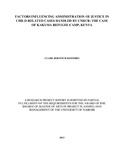| dc.description.abstract | Kenya is currently host to a large number of refugees many of whom are hosted at Kakuma Refugee Camp. About 50% of refugees are children who become especially vulnerable during armed conflict. One of the most essential components in the protection of refugee rights is through effective access to a justice system through which rights can be enforced and violations of rights rectified. While there has been some research in the area of administration of justice for refugees, there is limited study focusing on child-related cases. Therefore, the purpose of this study was to fill the gap in knowledge by examining the factors that specifically influence administration of justice in child-related cases handled by UNHCR. The study was carried out in Kakuma Refugee Camp focusing on 71 persons involved in child-related cases who filled questionnaires and 30 community leaders who participated in focus group discussions. Descriptive survey design utilizing both qualitative and quantitative approaches was used. The research instruments used were questionnaires, designed to gather objective data, interviews and three focus group discussions. The data was analyzed through qualitative and quantitative methods. The findings established that the refugee community has a role to play in administration of justice and that the UNHCR policy on children is streamlined with the child protection policies of the Kenyan Government. Although the Government of Kenya has an effective policy on administration of justice relating to child-related cases involving refugees, the refugees do not have a lot of trust in the justice system. They seem to believe that the police working in Kakuma and the judiciary have limited capacity to handle child-related cases. This indicated that there is not sufficient confidence in the capacity of these institutions to handle these refugee cases. The respondents also agreed that refugees resort to alternative justice systems because they do not understand how the Kenyan justice system works, hence they prefer to solve disputes through alternative means due to fear that they may have to bribe the authorities to get justice or it may be too expensive to take the matter to court. From the findings of this study it is recommended that UNHCR should create awareness and sensitization about refugee rights in the host state, human rights standards and Kenya‟s legal system to the refugee community. In addition they should also encourage children to report cases of abuse, build capacity among the police and security forces on refugee laws and human rights standards and on handling child-related cases. The Kenya Government likewise should increase the number of police officers and establish a permanent court including a children‟s court in Kakuma to increase access to the courts and reduce the burden of travel costs carried by refugees who have to attend court in Lodwar. They should also extend witness protection programmes to protect witnesses in cases where they fear for their safety. | |

